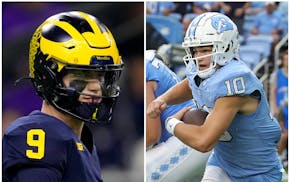Jonah Pirsig gave a verbal commitment to play football for the Gophers in July. The Blue Earth offensive lineman had scholarship offers from nearly every Big Ten school, including Ohio State and Michigan, but he informed recruiters that he was "firm" in his decision.
Gophers coach Jerry Kill and his staff didn't take any chances. They didn't smother him with a sales pitch, but they didn't ignore him, either.
Offensive coordinator Matt Limegrover checks in with Pirsig several times a week by phone and had dinner with his family Friday night.
Like every college program, the Gophers are busy finalizing their 2012 recruiting class in advance of Wednesday's national signing day. A critical part of that process is making sure recruits who already have committed stay committed. A verbal commitment no longer signals the end -- or likely outcome -- of the recruiting process.
"Committed nowadays just means you start recruiting them," Kill said.
A signed letter of intent represents the pot of gold at the end of a recruitment, but a verbal commitment is an important landmark. Commitments are nonbinding but, in theory, they serve the same function as a wedding engagement. That doesn't always guarantee the couple makes it to the altar. A commitment doesn't require other schools to stop recruiting the prospect, which is why coaches never view a "verbal" as a sure thing.
"Sometimes it's harder to hang on to them than to get that initial 'yes' because you become a target once they commit to you," said Mitch Browning, former Gophers offensive coordinator. "Especially if a guy is a real good player and has a lot of offers."
A recent study by SI.com found that nearly 15 percent of Rivals Top 100 players in a five-year window decommitted. Top-ranked quarterback Gunner Kiel decommitted twice during his recruitment -- first from Indiana and later LSU -- before enrolling at Notre Dame last week.
Hopkins wide receiver Andre McDonald committed to the Gophers twice. He originally committed last winter but then backed away. He switched to Vanderbilt but reneged on that commitment after the assistant who recruited him took a job at Illinois. He committed to the Gophers again on Thursday.
Decommitments have become so commonplace that recruiting sites created distinctions -- "soft" verbal and "solid" verbal. Imagine someone trying that approach in a proposal.
Sweetheart, will you marry me? Now this is a soft engagement. I love you, but I want to look around and keep my options open just in case.
"There is no such thing as a soft verbal," said recruiting analyst Tom Lemming of CBS Sports Network. "You're either committed or you're not. If you're visiting other schools, you're no longer committed."
Coaches are not always innocent bystanders. Many times they use pressure to coax a commitment. Here's a typical spiel: "We're recruiting five linebackers, but my head coach says we can only sign three. We want you, but we can't wait forever because those spots are going to fill up."
Commitments happen so early in the process now that this sort of thing is inevitable. Lemming traces the history of early commitments to Penn State in the early 1990s. Joe Paterno's staff began offering scholarships in the summer and securing commitments, and soon other schools followed suit.
The trend now is to get commitments from juniors, which forces schools to "protect their interests" even longer, according to Browning.
"You've got to make sure you're constantly following up and watch for all the signs they might be wavering or backing out on you," he said.
As an assistant at Kansas, Browning once tracked down coveted recruit Dana Stubblefield at a Friday night party at a friend's house. He used different tactics to sniff out other schools' interest in a recruit. He would scan a high school coach's desk to see if another recruiter had left a business card. He developed a close relationship with a certain janitor at a St. Louis high school that he recruited.
"The janitor knew everything about the kid," he said. "The minute I walked into school that janitor would come running over to me and say, 'Coach, the guy from Illinois was here yesterday. The guy from Missouri was here.' You can't be with the kid every day, but other people can."
Recruiting also causes some anxious moments for reporters. In January 2004, yours truly wrote a profile of Hutchinson All-America lineman Lydon Murtha, who committed to the Gophers after an unofficial visit during his junior year. Murtha received offers from elite programs across the country, but he rejected their overtures. The proposed headline: "Staying Home."
News leaked the day before the story was to be published that Murtha was visiting Nebraska (where he signed less than two weeks later). A hurried rewrite ensued as an ingenious copy editor changed the headline: "Staying home?"
Hey, you have to be flexible in recruiting.
Chip Scoggins • ascoggins@startribune.com
Gophers land some of the biggest in-state recruits.

Scoggins: Finch feeling heat of the Suns as playoff battle looms
Scoggins: Why 'championship or bust' fits these Wolves

Scoggins: Anatomy of a game-saving play as Correa throws out Ohtani


